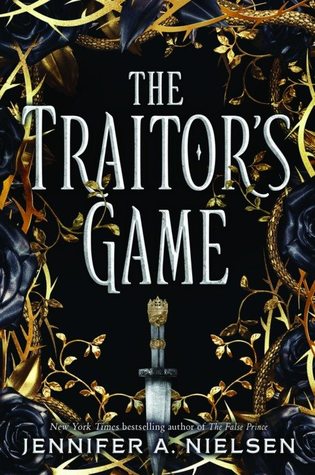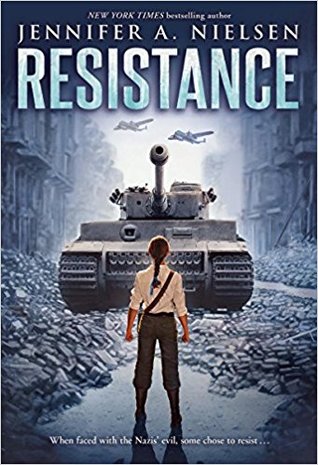Nothing is as it seems in the kingdom of Antora. Kestra Dallisor has spent three years in exile in the Lava Fields, but that won't stop her from being drawn back into her father's palace politics. He's the right hand man of the cruel king, Lord Endrick, which makes Kestra a valuable bargaining chip. A group of rebels knows this all too well - and they snatch Kestra from her carriage as she reluctantly travels home.The kidnappers want her to retrieve the lost Olden Blade, the only object that can destroy the immortal king, but Kestra is not the obedient captive they expected. Simon, one of her kidnappers, will have his hands full as Kestra tries to foil their plot, by force, cunning, or any means necessary. As motives shift and secrets emerge, both will have to decide what - and who - it is they're fighting for.
Chaya Lindner is a teenager living in Nazi-occupied Poland. Simply being Jewish places her in danger of being killed or sent to the camps. After her little sister is taken away, her younger brother disappears, and her parents all but give up hope, Chaya is determined to make a difference. Using forged papers and her fair features, Chaya becomes a courier and travels between the Jewish ghettos of Poland, smuggling food, papers, and even people.
Soon Chaya joins a resistance cell that runs raids on the Nazis' supplies. But after a mission goes terribly wrong, Chaya's network shatters. She is alone and unsure of where to go, until Esther, a member of her cell, finds her and delivers a message that chills Chaya to her core, and sends her on a journey toward an even larger uprising in the works -- in the Warsaw Ghetto.
Though the Jewish resistance never had much of a chance against the Nazis, they were determined to save as many lives as possible, and to live -- or die -- with honor.
In our last interview, you said, "We all have families, and while some might struggle more than others, we tend to want the best for everyone in our family circle." In what ways have family struggles made it into the stories you write, and what, if anything, do you hope readers glean from them?
Family seems to play a role in everything I write because I think it’s such a universal connector. In THE TRAITOR’S GAME, the central character, Kestra Dallisor, has one of the hardest family situations I’ve created, one in which some family members might not want the best for her. In my forthcoming RESISTANCE, a holocaust-era historical, Chaya Lindner has what I consider to be the most tragic of family circumstances, Even so, these two young women are both deeply affected and motivated by their desires for love within the family bonds.
Completely understandable. THE TRAITOR'S GAME is one of your first forays into young adult books--at least on the published side of things. How did you know this story was YA instead of middle grade, and was there anything that surprised you as you wrote it?
I knew that THE TRAITOR’S GAME would have to be young adult because the relationship between Kestra and Simon (one of the rebels in her land) was going to be so intense - and it only continues to intensify as the series progresses. Certainly there is a romantic element to that intensity, but there is also their individual roles and goals within the story which are not always compatible.
There are always surprises with each book I write - my characters will always have secrets that I discover along the way, but I didn’t realize how stubborn Simon is as a character - it makes him very challenging to write because he gets an idea and fiercely holds on to it, regardless of outside opinions. Sometimes that’s a good thing because it keeps him focused, but sometimes it creates enormous problems for him too. I also discovered a few surprises along the way about Kestra. She has an inner strength I deeply admire, one which propels her to do something beyond her reach simply because she trusts herself to figure it out along the way.
What she does in the first chapter certainly proves that! Speaking of which, you write some of the best beginnings I've ever read. What, in your opinion, are the necessary parts of an effective story beginning?
Thank you! I generally begin my stories mid-action, and usually with the character in a bind. This creates immediate tension and shows the character in motion. So when we first meet Kestra in THE TRAITOR’S GAME, she is quietly returning home after two years in exile. No one should know where she is and yet the road is blocked by members of the rebellion. Beginning with the first chapter, the reader understands that someone must have betrayed Kestra, they get to see how Kestra responds to the danger, and they are thrust very quickly into the main conflict of the story.
Which I love. If you could tell your younger writer self one thing, what would it be and why?
I was always a writer, but it took me a long time to understand that becoming an author was an option for me. I had such high respect for those who created the books I loved that it never occurred to me they might be real people living real lives who simply made the choice to pursue this career. I would tell my younger self to write for more than a hobby, to take every class available, and to read my favorite novels like they were textbooks on how to write. I would tell my younger self that amazing things are ahead, if only I will just believe it’s possible, and then sit down and write.
Buy: BookPassage ~ Amazon.com ~ Barnes & Noble ~ IndieBound
Buy: BookPassage ~ Amazon.com ~ Barnes & Noble ~ IndieBound
 Buy: BookPassage ~ Amazon.com ~ Barnes & Noble ~ IndieBound
Buy: BookPassage ~ Amazon.com ~ Barnes & Noble ~ IndieBound
Buy: BookPassage ~ Amazon.com ~ Barnes & Noble ~ IndieBound
 Buy: BookPassage ~ Amazon.com ~ Barnes & Noble ~ IndieBound
Buy: BookPassage ~ Amazon.com ~ Barnes & Noble ~ IndieBound
This post can also be viewed here.





 Buy:
Buy:  Buy:
Buy:  Buy:
Buy:  Buy:
Buy:
No comments:
Post a Comment